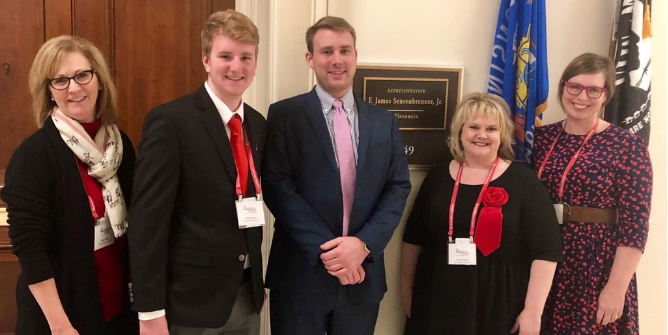
GLHF Addresses Key Issues Impacting the Bleeding Disorders Community at Washington Days
In March, GLHF staff participated in the National Hemophilia Foundation’s Washington Days on Capitol Hill in Washington, D.C. “Washington Days is an opportunity for people affected by bleeding disorders to advocate for issues that are critical for them,” said Danielle Leitner Baxter, GLHF’s Executive Director. “It’s a chance to meet with lawmakers and share stories and personal experiences about key issues.”
Washington Days attracted more than 500 volunteer advocates from nearly every state who met with legislators and staff to discuss federal bleeding disorders programs and ensure access to insurance. When asked by one advocate, Beth, why she thought it was important to attend Washington Days she said, “Hemophilia is so rare that most of our legislators don’t realize the care and costs associated with staying healthy. The people I met with were shocked at the high cost of factor and were unaware how specialized our treatments are.”
There were several stories, in particular, that made a lasting impact on legislators. Beth shared a story about her son with one legislator. It explained in no uncertain terms exactly how bleeding disorders can impact an entire family. “At parent teacher conferences, when my son was in third grade, his teacher told me that she had been teaching a lesson on wants and needs to the class,” said Beth. “She asked the students to give her examples of “needs” and my son raised his hand and said ‘health insurance’! She was shocked that a nine-year-old would have to think of health insurance. We explained that since day one we’ve taught our son that they can NEVER go without health insurance!”
Beth’s story was just one of many that advocates shared with legislators. These stories help explain the weight and impact that bleeding disorders have on not only the person who has hemophilia or other bleeding disorder, but how it impacts the entire family. And how these families literally depend on health care – it is one of the most important things to them in terms of leading a healthy and productive lifestyle – something that is entirely possible with the good, comprehensive care for the disorder.
The following outlines exactly what advocates were speaking to legislators about at Washington Days as their top priorities and concerns.
Federal bleeding disorders programs that Congress was asked to support include the National Institute of Health (NIH), the Centers for Disease Control (CDC) and the Health Resources and Services Administration (HRSA). NIH funds biomedical research on bleeding disorders. The CDC funds Hemophilia Treatment Center (HTC) surveillance and prevention activities and supports outreach and education programs provided by national bleeding disorders patient organizations. HRSA provides funding for HTCs to provide multi-disciplinary services not typically covered by insurance, such as PT and social work services. Also, as HRSA grantees, most HTCs participate in the 340B Drug Discount Program, which allows them to fund comprehensive care offered to all of their patients.
Advocates also continued their efforts to ensure access to insurance and oppose the proliferation of short-term plans. This includes support for the Affordable Care Act (ACA) patient protections that are critical for our community, including the elimination of lifetime and annual limits; elimination of pre-existing conditions exclusions and rating based on health status; creation of essential health benefit (EHBs) to ensure comprehensive coverage; and limits on out-of-pocket expenses.
NHF opposed the 2018 regulation that expanded short-term plans because these plans jeopardize access to insurance for people with pre-existing conditions. Short term plans don’t have to follow ACA patient protections, so they are inadequate for our community. In addition, short-term plans undermine the stability of the individual market by attracting younger, healthier people to purchase them, creating two insurance markets (one for the sick and one for the healthy), raising premiums for those with pre-existing conditions.
GLHF and NHF continue to urge Congress and Wisconsin lawmakers to support patient protections for everyone with pre-existing conditions by co-sponsoring legislation to stop the regulation that expands short-term plans.